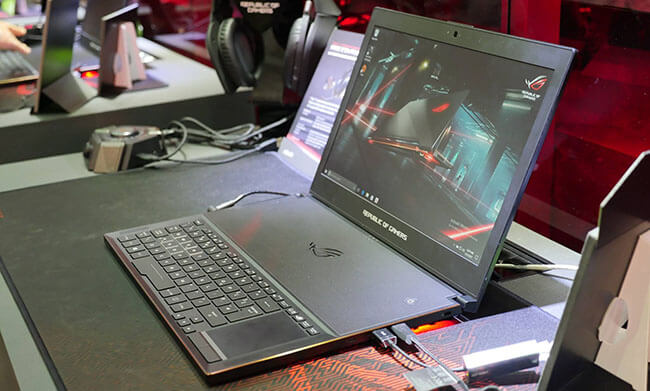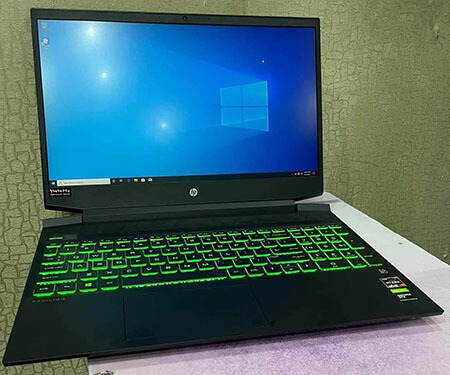It is common for a laptop to shut off while playing extensive games for a brief amount of time.
Why laptops shut down when playing games is nearly often due to hardware breakdown rather than overheating. But if it’s due to the Overheating you can check this article to solve your problem.
Another issue here might be a faulty power supply unit (PSU). The power must be increased. If the power supply fails to provide enough power, components such as the GPU may malfunction, causing your device to shut down.
Why laptop shut down while gaming?

Laptop GPU can cause the device to turn off:
The Most Common Causes of Laptop Shutdown While Playing Games Not Overheating GPU Can Force Computer to Shut Down Randomly.
When it comes to gaming, GPU failure is a very real issue, and it will force the laptop to randomly shut down. During a protracted gaming session, the GPU works harder than virtually any other element. As a result, there is a high likelihood that something will go wrong.
Assume you’re in the midst of a tough Fortnite battle. You’re putting a lot of demand on the GPU as well as the CPU.
The GPU needs to put forth a lot of work to attain high frame rates. As a result, the temperature of the GPU will rise.
Now, assuming you have enough airflow, the temperature will stay controlled and your machine will continue to function correctly. The GPU, on the other hand, will overheat if the cooling is insufficient.
When a GPU overheats, it loses performance (thermal throttling) and, in certain situations, shuts down to avoid long-term damage. Furthermore, faulty GPU drivers might result in unanticipated shutdowns.
Nvidia and AMD, for example, often provide driver upgrades. Drivers are often misconfigured, resulting in erratic crashes and slowdowns. If your PC’s brightness is not configured, this will also cause a computer to shut down at random.
Finally, a GPU is a mechanical component that degrades over time. An aging GPU can’t keep up with the demand and is too damaged by heat to function correctly.
So, if your GPU is older than 5 years, it’s time to replace it. In brief, the GPU will shut down a system if it overheats, has poor drivers, or is simply too old and unreliable.
A faulty Power supply of the Laptop can cause it:
Even when overheating is not an issue, a faulty power supply unit (PSU) is frequently the source of sporadic crashes and the laptop Randomly Turns Off.
Because the job of a power supply unit is to give power depending on the needs of the components, a faulty PSU will bring the entire system down. When you play games, your power consumption skyrockets.
If you have a strong PSU with appropriate wattage, your system will continue to run as long as all other components are in excellent working order.
If the PSU fails to meet the power requirement, the components will crash. As a result, the majority of gamers experience sporadic crashes while playing.
You can address this issue by Plugin-in your power adapter while playing extensive games on your laptop. So that, you’ll have enough power to go through & render the graphics at their highest end.
RAM (Random Access Memory) is a critical component:
All of the game’s attributes, including graphics, music, and other data, are saved in RAM while the game is running. This implies that when you score goals in Rocket League, the RAM is working hard.
Consider the consequences if the RAM was incompatible with the motherboard and CPU. If there are any compatibility issues, they may become apparent during gaming, leading to random crashes and laptop shutdowns. On the other hand, you might just have a faulty RAM chip.
You may not know it, but malfunctioning RAM modules are fairly prevalent, especially when they are often used. As a result, always buy fresh modules from reliable manufacturers.
Make sure the RAM/s in your laptop are working fine & has no defects.
Laptop CPU 90 degrees while gaming Is it Overheat?

The most important component to keep an eye on is the CPU temperature. The CPU is the heart of your entire PC (Desktop or Laptop), and if you’re wondering how crucial a CPU is for gaming, this should be at the top of your list.
Following your CPU monitoring, you may wonder, “How hot should my CPU be while gaming?” The solution is straightforward, but maintaining the proper CPU temperature would be a more difficult process.
If your Laptop CPU is going over 90 degrees while playing a game your should follow this guide for what to do in this situation.
You may wonder is it harmful to the Laptop CPU to be at 90 degrees celsius?
Well, opinions differ, but conventional belief holds that anything beyond 85 degrees is harmful in the long run, and anything above 90 degrees Celcius is dangerous.
Thermal throttling occurs around 90 degrees Celsius (your laptop downclocks the CPU to conserve heat), and my laptop shuts down at 94 degrees Celsius.
What are your options? There are quite a few things you can do regarding this:
- Never use your laptop on a soft, cloth-covered surface. Couches, cushions, blankets, and so on. The issue here is that your air vents are clogged, which may quickly ruin your laptop. Covering up vents is an invitation to tragedy.
- If you have an Intel CPU, you may disable Turbo Boost. Turbo Boost allows your CPU to briefly run at a much higher clock speed. It works as intended on most desktop computers, which should have better cooling, but it can raise the temperature of your laptop.
- You have the option of undervolting your CPU. You may use Intel Extreme Tuning Utility if you have an Intel CPU. The program is quite simple to use. Opinions differ on how far your CPU may be undervolted. If you go too far, it will become unstable and just not operate properly, and I’m sure there will be a point when you have so little power coming to the CPU that it will BSOD your machine and reboot. Read several forums to find out what has worked for others.
- Purchase an external cooling fan. This option will erase most of your headaches regarding CPU overheating in the laptop.
- If your CPU is being cranked up to 80–90 degrees Celsius by games, consider adjusting the in-game settings to attempt to modify that. Shadows may be reduced to immediately provide better temperatures. Obviously, resolution. You may also reduce anti-aliasing to aid with temperatures. Most settings you don’t want to turn off completely (turning off anti-aliasing altogether makes stuff pretty ugly, for instance). While the GPU conducts most of the hard lifting in gaming, the CPU also contributes significantly. Some games are known to put greater strain on your CPU than your GPU (dubbed “CPU intensive games”).
To give you an example of how I manage this on my laptop:
My computer is an Acer Nitro 7. Excellent laptop for the amount I purchased, although it has been known to have temperature concerns. It has an Intel CPU, which is why I gave the Intel advice.
I’ve disabled Turbo Boost, slowed the CPU to -0.125 volts, and installed a great cooling fan beneath it. It’s a gaming laptop, and I mostly use it for that.
All of my games had temperatures in the low to mid-80s. I let a couple push my CPU into the mid-80s, but I never let a game run at 85 degrees or higher.
Conclusion:
We all want our laptops to work consistently and reliably. We hope that the tips given above will assist you in resolving any shutdown difficulties and restoring the steady performance you have come to expect from it.
